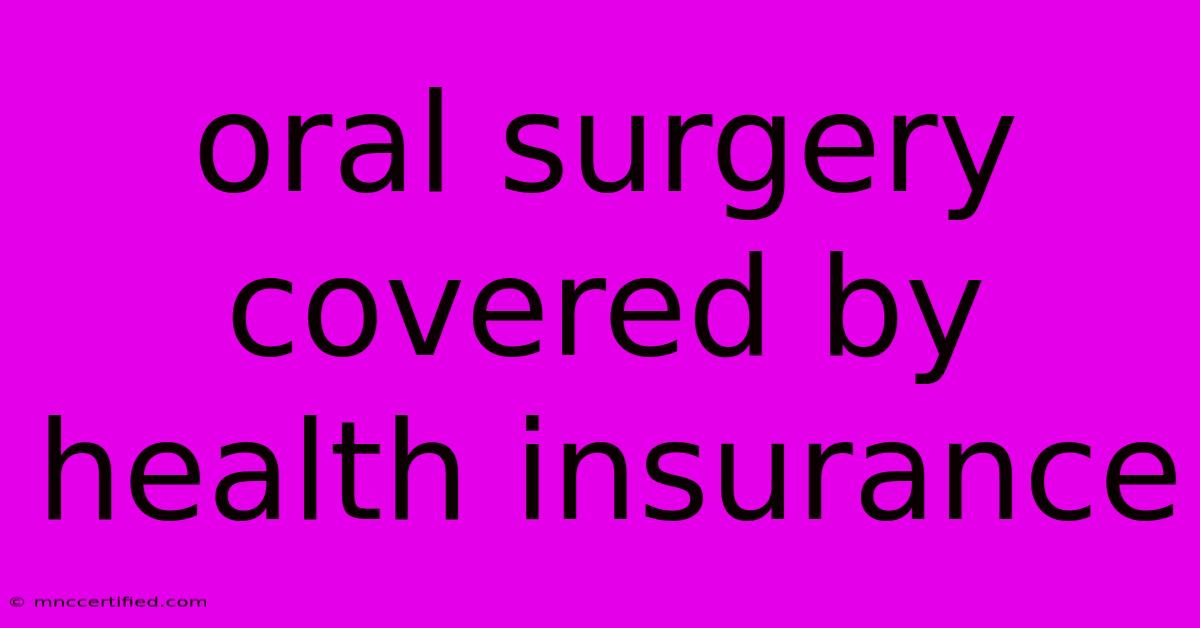Oral Surgery Covered By Health Insurance

Table of Contents
Navigating Oral Surgery Coverage: Understanding Your Health Insurance Benefits
Oral surgery can be a significant investment, and knowing what your health insurance covers is crucial. Many people are surprised to learn that certain oral surgeries, like wisdom tooth extractions, may be fully or partially covered by their insurance plans. This article will break down how oral surgery coverage works, common procedures, and how to maximize your benefits.
What Types of Oral Surgeries Are Covered?
The extent of oral surgery coverage varies significantly between health insurance plans. However, here are some common procedures often covered:
- Wisdom Tooth Extraction: Removing impacted wisdom teeth is a frequent reason for oral surgery, and most dental insurance plans cover this procedure.
- Implants: Dental implants are a popular solution for missing teeth, but coverage can be limited. Some plans may only cover a portion of the cost, or require a pre-authorization.
- Bone Grafting: This procedure is often required for implant placement or to address bone loss due to tooth decay. Coverage can be limited, but many plans offer some reimbursement.
- Sinus Lifts: A sinus lift is a surgical procedure that lifts the sinus membrane to create space for bone grafting, often required for implant placement in the upper jaw. Coverage varies, but some plans may cover this procedure.
- Cleft Palate Repair: This complex surgery involves repairing a birth defect in the roof of the mouth. Most health insurance plans cover this procedure.
Understanding Your Policy:
1. Dental vs. Medical Coverage:
- Dental Insurance: Typically covers preventive care, cleanings, fillings, and basic extractions. Some plans may also cover a portion of the cost of oral surgery.
- Medical Insurance: May cover certain surgical procedures related to the mouth, such as bone grafts or sinus lifts, if they are deemed medically necessary.
2. Deductibles and Co-pays:
- Deductibles: The amount you need to pay out of pocket before your insurance starts covering the cost.
- Co-pays: Fixed amounts you pay for each service or visit.
3. Coverage Limits:
- Annual Maximum: The maximum amount your insurance will pay towards your dental care in a year.
- Procedure Limits: Some plans may have specific coverage limits for certain procedures, like implants or bone grafting.
4. Network Coverage:
- In-Network Providers: Dentists and oral surgeons who are contracted with your insurance company. You'll generally pay lower out-of-pocket costs.
- Out-of-Network Providers: Dentists who aren't in your network. You'll likely pay higher costs, and your insurance might not cover as much.
Maximize Your Coverage:
- Read Your Policy Carefully: Familiarize yourself with your coverage details, limits, and exclusions.
- Contact Your Insurance Provider: Ask questions about your specific coverage, pre-authorization requirements, and the best way to maximize your benefits.
- Choose an In-Network Provider: This can significantly reduce your out-of-pocket expenses.
- Consider a Dental Savings Account (HSA): This tax-advantaged account can help you pay for dental expenses, including oral surgery.
- Explore Financing Options: If your coverage is limited, consider dental financing options or payment plans offered by your dentist.
Tips for Getting Pre-Authorization:
- Obtain a Referral: Get a referral from your primary care physician or dentist if required.
- Gather Information: Prepare all necessary medical records, including previous dental work and radiographs.
- Submit the Request in Advance: Don't wait until the last minute. Submit your pre-authorization request at least a week or two before your procedure.
Conclusion:
Navigating oral surgery coverage can be complex, but understanding your plan and its benefits can help you make informed decisions and avoid unexpected costs. By following the tips outlined above, you can maximize your insurance coverage and ensure that you receive the care you need without breaking the bank.
Remember: Contact your insurance provider directly to receive personalized information about your specific plan coverage and any pre-authorization requirements for your specific needs.

Thank you for visiting our website wich cover about Oral Surgery Covered By Health Insurance. We hope the information provided has been useful to you. Feel free to contact us if you have any questions or need further assistance. See you next time and dont miss to bookmark.
Featured Posts
-
Tom Hanks Reveals His Celebrity Doppelganger
Nov 08, 2024
-
Outer Banks Season 4 Part 2 Ending What Happens
Nov 08, 2024
-
Ravens Thursday Night Football Channel Tonight
Nov 08, 2024
-
Insurance Companies In Hendersonville Nc
Nov 08, 2024
-
Trump Win Leaves Kimmel Heartbroken
Nov 08, 2024